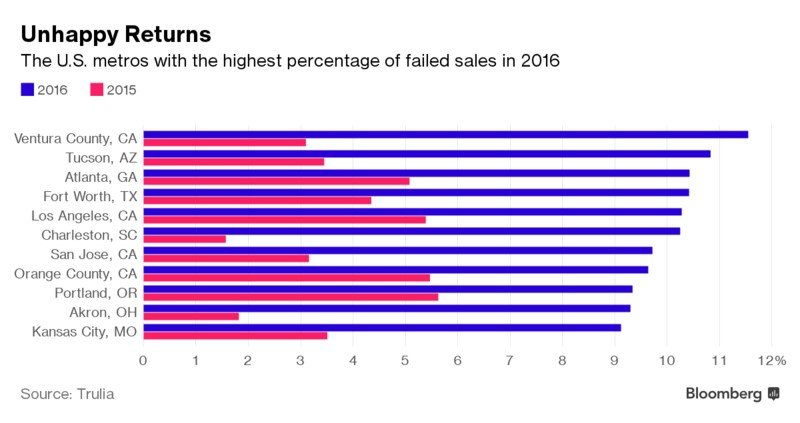

January 10, 2017, 9:01 PM PST January 11, 2017, 8:07 AM PST
Spending months to find the perfect home in your price range, only to have your mortgage application rejected, or a home inspection turn up expensive repairs, is a nightmare—one that is coming true with increasing frequency, according to a new report from real estate listings website Trulia.
A Trulia analysis of U.S. listings shows that 3.9 percent of homes that moved from for-sale to pending moved back to for-sale again, nearly double the rate in 2015. Such “failed sales” increased in 96 of the 100 biggest U.S. metros, with big swings in areas large and small, rich and poor. That includes Los Angeles and Charleston, S.C., as well as San Jose and Akron, Ohio.
In Ventura County, Calif., where the median home value is $548,000, 11.6 percent of prospective sales failed to close in 2016. That’s the highest in the U.S., up from 3.1 percent in 2015. Tucson, where the median home price is $176,000, had the second-highest rate of failed sales, at 10.8 percent, up from 3.5 percent the year before.
The problem of failed sales has been most acute for cheaper homes and older ones: Some 6.3 percent of sales of starter homes fell through last year, according to Trulia’s analysis, compared with 3.6 percent of so-called premium home sales. Homes built in the 1960s had the highest fail rates, while sales of newer and older houses were more likely to go through.
Trulia’s data don’t explain why listings reverted from pending to for-sale, but broadly speaking, a few factors can reliably torpedo a deal:
The buyer’s mortgage doesn’t come through.
This can happen even for buyers who have been prequalified, especially when a buyer has to stretch to outbid rival house hunters. It’s worth noting that borrowers are having an easier time getting mortgages: 77 percent of purchase mortgages made it to closing in October, according to mortgage software company Ellie Mae, the highest percentage since 2012.
A home appraiser values the home below the sales price.
Low
appraisals are more common in hot markets, where buyers bid up prices
beyond what appraisers think homes are worth. But there were plenty of hot
markets in 2015, when the fail rate was lower, so it's not obvious why low
appraisals are responsible for increased failed sales. Navigating the appraisal
process has been an issue for buyers since reforms passed in the aftermath
of the foreclosure crisis, said Robert Gleason, chief executive officer of the
Greater Forth Worth Realtors Association. “Any area you have a hot market is
going to be a concern,” he said. “Prices have gone up quite a bit, and it can
take a while for appraisals to catch up.”
Defects discovered in home inspections give a buyer reason to walk away.
A house that needs expensive repairs to fix a cracked foundation, say, or a faulty roof, may stop looking like a good value. That helps explain why sales of older homes are more likely to fall through.
As to why these things might be throwing a wrench into more sales than before, Felipe Chacón, a data analyst at Trulia, said an increase in first-time homebuyers could offer a plausible explanation. Inventory shortages in many U.S. markets have been most acute for the entry-level homes first-time buyers usually seek. Those buyers can face greater scrutiny from mortgage lenders, Chacón said.
Trulia’s data only go back two years, so they don’t indicate what rate is historically normal. Lyle Elliott, branch manager for Berkshire Hathaway HomeServices office in Ventura, Calif., didn’t think his metropolitan area’s fail rate of 11.6 percent was particularly surprising. “We’ve had a robust year,” he said. “When you have more sales, you also have more sales that don’t complete.”

The idea of buying a home without having it inspected by a professional home inspector first seems almost unthinkable, but there also are many reasons for a seller to have an inspection before putting a home on the market. The increase in demand for pre-inspections can only be a win for home inspectors.
In the article “ The trend of inspecting your home before you sell is catching on in Utah ” by Rodger L. Hardy on HeraldExtra.com, Massachusetts realtor and blogger Bill Gassett listed seven benefits of having a home inspected before being sold.
According to Gassett, pre-inspections:
1. Reduce the stress of selling a home — An inspection will tell the seller what needs to be done to make the home more sellable.
2. Help with pricing the home correctly — Buyers won’t be able to so easily attack the price of the home.
3. Speed up the sales process — Any issues found during the pre-inspection can be taken care of in advance.
4. Allow you to make repairs —A home that is free of problems is a great marketing tool.
5. Avoid the need for renegotiation —A buyer’s inspection that finds major problems can kill a carefully crafted offer.
6. Help improve buyer confidence — The last thing you want to do when selling a home is create doubt about its integrity.
7. You make your agent’s job much easier — Pricing and negotiating the sale of the home are more difficult when repair issues come to light.
"Once the pre-inspection is completed, the listing agent and their client can then sit down and prioritize the repairs that must be done in order to ensure a smooth sale," Chad Taylor of Taylor-Made Real Estate Service in Kansas wrote in the ShawneeMissionPost.com article, “ Your Home: Pre-inspections – best money a seller can spend ."
Taylor also noted that when repairs are made from a pre-inspection, the home can then be marketed as having been pre-inspected, which helps defend the listing price of the home.
According to Taylor, other benefits of a pre-inspection include:
• Higher bids for the home
—
Buyers tend to bid the price up more aggressively.
• Fewer surprises
— You don’t want a buyer surprised by an unexpected
defect in the home.
• As is: two very sweet words to a seller’s ears
— In many cases, a
buyer will accept a pre-inspected home as is.
• Good faith
— A pre-inspection starts the buyer/seller relationship off
on a good note.
• Limited opportunity for recourse
— A pre-inspection disclosed to the
buyer before contract helps protect the seller in the event something fails on
the home after the sale.
As pre-inspections become more population among sellers, it may be a good idea for home inspectors to include information and rates about pre-inspections in their business's marketing plans.
- Courtesy of AHIT
mati5G���r�Dean Alm started his business, Napa Valley Home Inspections, in 2008 — right as the recession was taking hold on the economy.
“It was tough breaking in,” Alm admitted. But with persistence, he was able to survive the economic downturn.
Today he has a successful business offering “my lifetime of property experience to help people with their real estate transactions.”
What’s a common misconception you get about your industry?
People have a tendency to look for the cheapest home inspector and that’s a bad idea.
Do you have any tips for those who need an inspection?
Do your homework. This is one of the biggest investments you’ll ever make in your life. You have a right and responsibility to know what you bought. Happy homes require a smart start. That’s corny but it sums it up.
What’s something people might be surprised to know about you?
I have a bachelor’s degree in economics and urban design and development. I also spent eight tough years as a Realtor in the ’80s after college, before home inspectors were common.
What was your first job?
My first real job was as a welders helper on a pipeline at age 14 in Alberta, Canada. I made enough that summer to buy my first car, an orange VW bug.
What was your childhood ambition?
I was going to be an architect.
What is the biggest challenge your business has faced?
Getting Realtors to understand that I simply report what I see, it’s not positive or negative, it just is what it is. Now that they have the information they can guide their clients (to negotiate) effectively. Every home has issues. Clients have a right and a responsibility to know the true condition of the home before they move in.
If you could change one thing about your business, what would it be?
I’d like to limit the number of crawl spaces I visit every week. Delegating that task is hard to do when my reputation is on the line.
Who do you most admire in the business world?
My father was a farm kid from the prairies, the youngest son of a Swedish immigrant lumberjack who died at 92 in 1972. Both of these men made a real contribution to the advancement of our family and their communities. I have the utmost respect and admiration of both of these humble, honest men for their victories and their vices.
What’s on your to-do list?
I have a solar business in the wings.
Which other Napa County business person(s) would you like to see featured in “10 Questions for …”?
Pat Sweeney, Silver Auto Service.
Cyndi Gates, Gates Estates Realty.
Those buying a condo may think that they are in the clear when it comes to needing a home inspection. But that's not necessarily so, according to Stephen Moranis, former president of the Toronto Real Estate Board and a former Director of the Canadian Real Estate Association.
"Things go wrong with condos, too, which is why I have advised on countless occasions that condo buyers get what potential home owners almost always get: a professional inspector ," Moranis wrote in " Do you need a home inspection when you buy a condo?"
"The status certificate on the general state of the condo and condominium corporation isn’t enough: an inspection gives added legal, financial and emotional security and cannot be more emphatically recommended," he added.
Moranis, who has been active on the North American real estate scene for more than 40 years, suggested condo buyers and their home inspectors look for several potential issues. They included:
• Check for spotting on floors and walls, floors that are sloped or warped or loose carpets and tiles. All of these are signs of water damage.
• Cracked walls, which could suggest a structural problem.
• Spotting on walls and windows may indicate mold in the unit.
• There should be no cracks in glass panes, screens should work and cabinetry drawers and doors should be level, open and close easily and fully operational.
• Look for gaps or missing caulking in all of the tile work.
• Check the exterior and common areas of the building to see what maintenance has been done by the building’s ownership.
• Ensure there is enough water pressure with both hot and cold taps, and that all drains are working well.
• If you notice any foul smells in the unit, trust your instincts. Can the source be identified? Is the unit properly ducted and vented?
• Make sure the electrical systems and HVAC systems work. If there is an HVAC in the unit in addition to a central building system unit, have both inspected. Ask if and when the HVAC filters were changed last and the ducts cleaned.
• Ask if there has been a technical audit of the building to determine the actual condition of the building.
• Read the condo corporation minutes from the last few years to check for signs of exterior and maintenance problems. Look for evidence of major structural repairs and their cost. This is important because you are buying into the structure, Moranis noted.
"Remember, you will be liable for repairs once you become a partial owner of the condominium corporation," he wrote.
Whether a home inspector has to be licensed or abide by specific regulations to practice varies by state. Some states have no professional requirements for home inspectors.
What does the inconsistency in licensing and regulations among states mean for the home inspection industry and consumers? AHIT's Home Inspector Blog asked a few experts to weigh in.
Licensing environment
Frank Lesh, executive director, American Society of Home Inspectors, said states’ regulation of the industry has been at somewhat of standstill.
“Currently, approximately 35 states require some form of home inspector regulation," Lesh said. "Regulation includes everything from full blown licensing, as well as just registering as a business doing home inspections,” said Lesh, who served as ASHI’s president in 2007. “It’s difficult to predict if more states will move in that direction. There was a large trend in that direction years ago, but it has slowed down.”
Chris Chirafisi, technical training manager, American Home Inspectors Training Institute, and a licensed home inspector in Wisconsin, Kentucky and Florida, said very few states are introducing licensing and agreed that the push has waned.
Frank Lesh
“Vermont recently introduced licensing and Virginia has licensing going into effect July 2017,” Chirafisi said. “But there has been very slow movement for states to actually adopt licensing/regulations in recent years.”
Lesh, founder of the Home Sweet Home Inspection Company, Indian Head Park, Ill., said licensing sets a minimum standard of compliance with the law, but the key word there is “minimum.”
“Unfortunately, consumers have the expectation that because a license is necessary, then all inspectors are the same,” Lesh said. “Nothing could be further from the truth. The analogy I like to use is most barbers and hair dressers are licensed, but consumers can still get a bad haircut.”
Not all home inspectors agree, however. Brendan Ryan, president of the Pennsylvania Home Inspectors Coalition, said the state law in Pennsylvania is more like a trade act, and it’s pretty much self-enforcing. But that could change. There’s a bill in the legislature to incorporate the trade act into state law — a licensing law, which would include the formation of an oversight board and entry licensing for home inspectors.
Ryan, who has been a home inspector for 26 years and is president of CSA Home Inspection, is pro licensing.
“The reason that I am for it is that it does create a specific bar that must be achieved for proficiency, whereas with the current trade law or no licensing, there is no true basic standard for proficiency and consumer protection,” Ryan said. “In states where there is no licensing, there will be lack of people getting the education to stay abreast of any new system components in homes or in a unique situation that may occur. Continuing education is a major part of our profession. Without licensing, there are no educational requirements, no testing requirements. There are no requirements for carrying insurance.”
“Unfortunately, consumers have the expectation that because a license is necessary, then all inspectors are the same. Nothing could be further from the truth. The analogy I like to use is most barbers and hair dressers are licensed, but consumers can still get a bad haircut.” — Frank Lesh
Licensing’s limits
According to Kevin O’Malley, author of the industry text “Marketing and Operating a Successful Home Inspection Business,” and co-founder of HomeownersNetwork.com, licensing, itself, means little but the demonstration of minimal proficiency.
Whether a state requires licensing or not, “cream rises," he said. "Some people have ethics and integrity and some don’t. I don’t believe licensing requires any of those things,” said O’Malley, who also is chief managing officer of Warrantee Management, LLC.
Licensing is a good start, according to Chirafisi, but a big part of licensing depends on what the state actually requires to obtain the license.
Chris Chirafisi
“Some states only require you to pass an exam and then they grant you a license, which is really ridiculous,” Chirafisi said. “Other states require you to complete a certain amount of educational hours that pertain to home inspection, pass the National Home Inspectors Exam and complete a certain amount of ride-along inspections with a licensed inspector. That is a much better way to make sure that home inspectors are being professionally trained and getting that important hands on experience.”
Home inspection is not a get-rich-quick scheme; it takes hard work and time, he said.
“I think these states that don’t have at least minimum requirements are doing a disservice to the residents and consumers who are purchasing a home,” Chirafisi said. “Just because someone has been in the trades or in one specific trade does not qualify them to perform home inspections. For example you may have an HVAC tech that is an expert in that particular field (heating and cooling), but what do they know about the structure of the home or the electrical system? A professionally trained qualified inspector will know about all the different systems of the home inside and out.”
Licensing often starts with a reasonable goal of “making sure inspectors are qualified,” but states typically don’t have the ability to adjust the profession to changing conditions, Lesh said.
“For example, when ASHI decided to include inspecting appliances, we did it. Trying to get the government to change something is much more difficult,” Lesh said.
Beyond licensing
In states that require licensing, the tendency is for consumers to lump home inspectors into the same group, rather than according to individual credentials, Lesh said.
Licensing doesn’t separate the most from the least knowledgeable inspectors. Rather, organizations like ASHI do that, he said.
“ASHI has built its reputation on 40 years of trust and its third-party certification, which separates ASHI from any other home inspection organization,” Lesh said.
The best thing inspectors can do to further their careers is get involved with a professional organization like ASHI that is certified by an outside credentialing agency, Lesh said.
In unregulated (and even regulated) states, the best thing that home inspectors can do is to get professionally trained, Chirafisi said.
“A well-rounded home inspector not only has technical knowledge but also has excellent communication and people skills,” Chirafisi said. “My advice is to attend one of our live training courses where we take you out on actual home inspections, so you get familiar with the inspection process and get to see different inspection scenarios. And for the individuals that are looking to start their own business, we include, as part of the training, business and marketing development.”
| Buyers can do a preliminary check of a home before putting in a bid, but nothing takes the place of a professional home inspection, according to an article in the Tri-County (Mich.) Times. In the article, staff reporter Vera Hogan wrote that making the home inspection a condition of the sale is a smart move. "When choosing a home inspector or home inspection company, buyers should do a little homework. Ask for referrals from friends and family," Hogan wrote in the article. "Real estate firms often have a concierge desk or table with the business cards of home inspectors that do work in the local area." Similar to other states, home inspectors in Michigan do not have to be licensed, so Hogan recommends buyers look for home inspectors who are members of the National Association of Home Inspectors . Hogan's husband, Mike, a former professional home inspector, said both buyers and sellers should be aware of what a home inspection entails. "Home inspectors almost always work for buyers so it is important for sellers to remember a few things before the inspection appointment," Mike Hogan said in the article. He provided some key points for sellers to remember when preparing their home for sale: • Keep the attic and basement accessible.The attic and basement are important areas to be inspected, and home inspectors need to get to them. • Empty the bathtub.People often use a bathtub to store toys and laundry, Mike Hogan said in the article. Make sure all items are removed prior to the home inspector's arrival. "Home inspectors need to fill each bathtub in the home as part of the plumbing inspection ," Vera Hogan wrote. • Be prepared to hire a repairman.Sellers sometimes mistakenly believe the home inspector will repair any defects found during the inspection. “We only point out that there is a problem, we don’t fix it,” Mike Hogan said in the article. “We don’t require them to fix it either. Whether it gets fixed or not and who pays for the repair is usually negotiated between the buyer and seller, with the help of their agent." |

